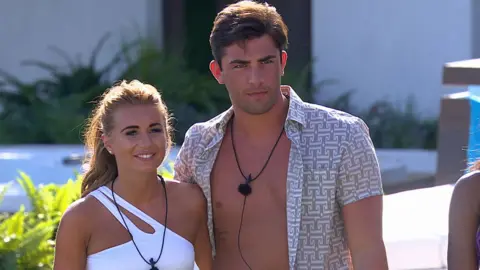Love Island breaks ITV2 record
 ITV
ITVThe launch show of the new series of Love Island has given ITV2 its biggest-ever audience.
It broke the record set by the finale of the 2017 season of the dating show.
An average of 2.95 million viewers watched as the new islanders entered the Love Island villa, looking for love - and hoping to win the £50,000 prize.
It's more than double the audience for last year's launch show. The premiere was the highest-rating programme at 9pm, across all channels.
The show was on from 9pm to 10.35pm. In the same timeslot as the start of the show on BBC One was Suffragettes with Lucy Worsley, which got an average audience of 1.73 million.
 ITV
ITVITV had 2.32 million with The Queen's Coronation in Colour, while 24 Hours in Police Custody on Channel 4 had the third-highest audience with 2.23 million.
Love Island had a 16.4% audience share and peaked at 3.4 million viewers. The total number of viewers is also likely to rise when catch up services are included.
Last year's launch show was watched by 1.3 million viewers.
Monday's launch saw 10 singletons, including an A&E doctor and actor Danny Dyer's daughter, arrive at the villa on the Spanish island of Majorca which will become their home for the coming weeks.
They had all been coupled up when a sixth male contestant was then introduced, with host Caroline Flack explaining he had 24 hours to pick one of the women to pair up with - which will then leave another man on his own.

Reality Check: Love Island vs Oxbridge
 ITV
ITVBBC Reality Check spotted a claim doing the rounds - that more people had applied for Love Island this year than to Oxford and Cambridge universities combined.
This might not sound entirely surprising - Oxford and Cambridge are famously elite universities with heavy workloads while Love Island is a villa in sunny Spain with the chance of winning £50,000.
But is it true?
ITV says more than 85,000 people applied to appear on the reality TV show this year, giving applicants about a one in 8,000 chance of making it into the villa as one of the first 11 contestants.
More people will be introduced as the series goes on - last year a total of 32 people entered and left the Love Island villa. If the figures are the same this year, that brings applicants' odds down to one in 2,656.
In contrast, 19,938 people applied to undergraduate courses at Oxford in 2017, with 3,771 people being offered a place - a one in five success rate.
Cambridge received 17,189 undergraduate applications and made 4,485 offers - giving applicants about a one in four chance of getting in.
So, well over twice as many people applied to be on Love Island as applied to Oxbridge - and their chances were much slimmer too.

To stay on the show, contestants must be in a couple.
Dani Dyer paired up with sales manager Jack Fincham on the opening episode and the pair are the early favourites to be the winning couple.
Doctor Alex George was unlucky in love, with none of the women stepping forward when asked to indicate which of the men they were keen on. He was eventually paired with musical theatre performer Samira Mighty - who had not been chosen by any of the male contestants.
Last year's contestants have been quick to weigh in with their opinions.
2017 winner Amber Davies already has her favourites.
Allow X content?
While Marcel Somerville said that everything could change and that there was still hope for Alex.
Allow X content?
Gabby Allen said the show had already taken over her life - and she's probably not the only one.
Allow X content?
Some people weren't happy about the lack of diverse body types shown on Love Island, however.
Journalist Angelica Malin said it "spreads such a bad message to young girls that all women look like that".
Allow X content?
And YouTuber Maddie Bruce agreed that more diversity was needed.
Allow X content?

Follow us on Facebook, on Twitter @BBCNewsEnts, or on Instagram at bbcnewsents. If you have a story suggestion email entertainment.news@bbc.co.uk.